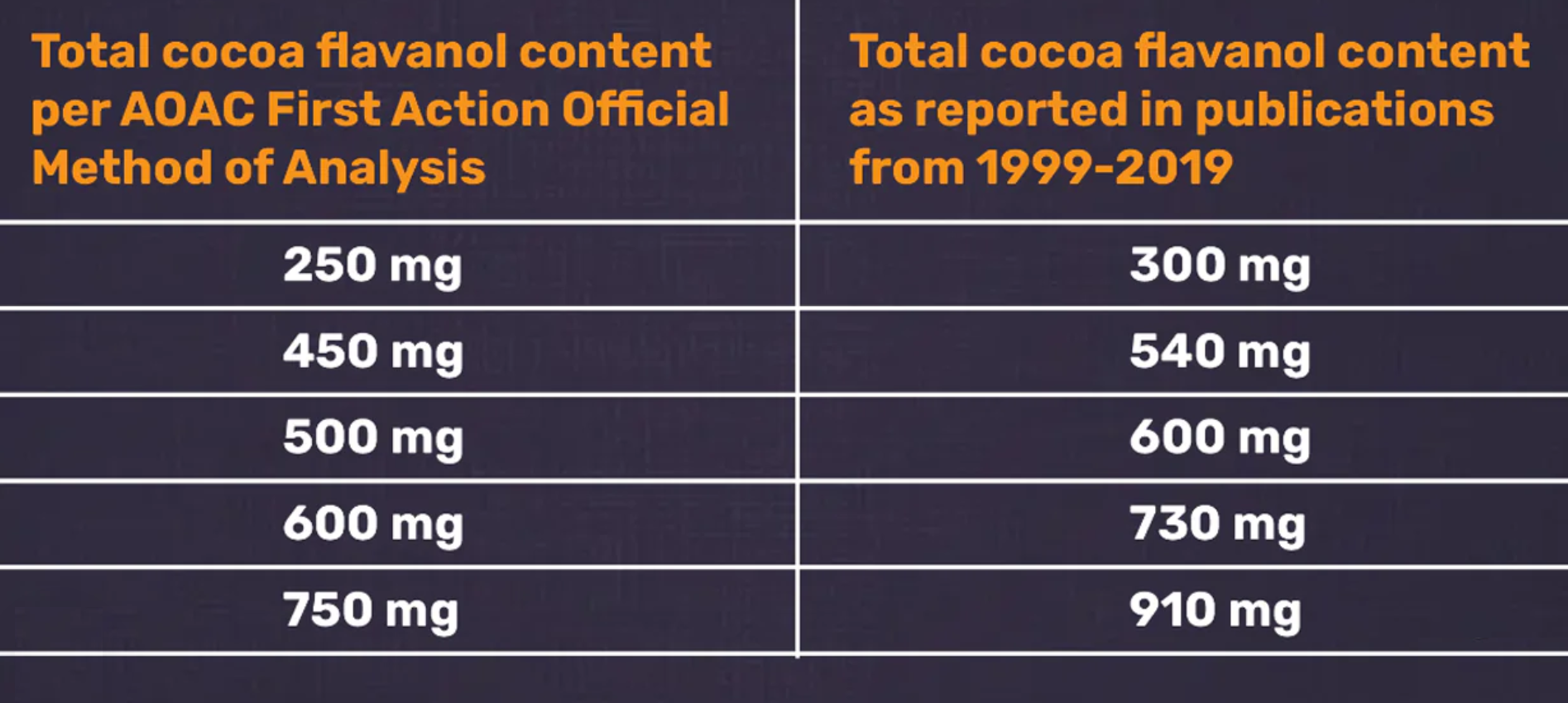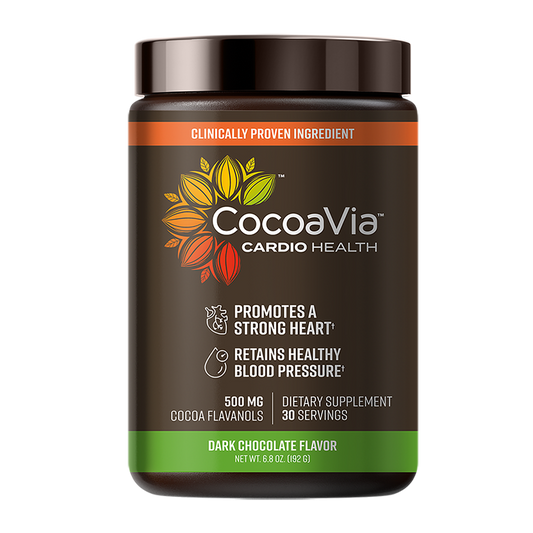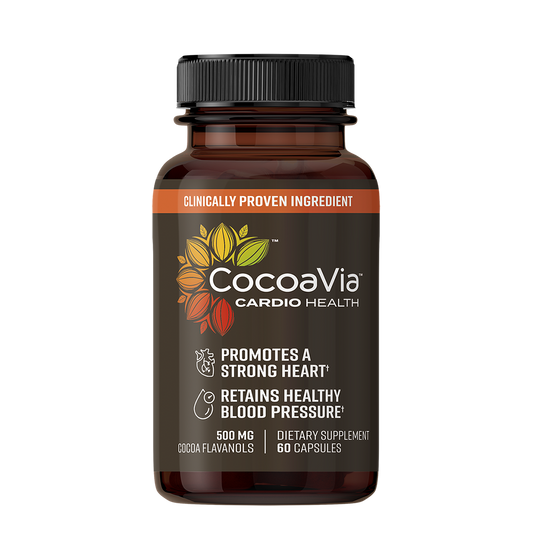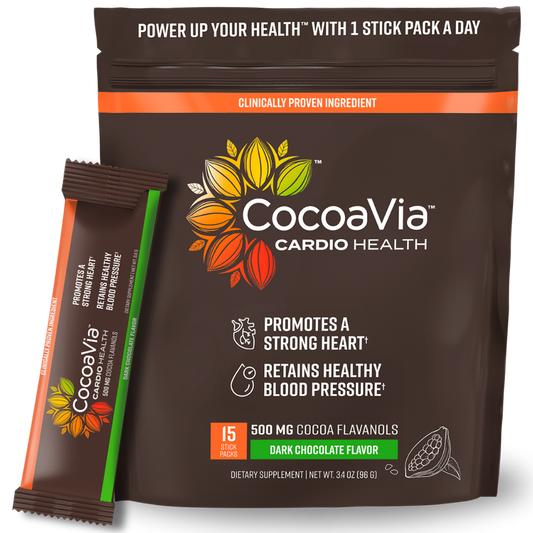
Cocoa Flavanol Cardiovascular & Heart Health Study
Published in the British Journal of NutritionSep 9th 2015
Study Details
- A leading German University conducted a study to test whether cocoa flavanols could help maintain cardiovascular health in people with no history of heart disease, after previous studies had demonstrated benefits for at-risk populations.
- Healthy people between the ages of 35 and 60 consumed about 400 mg of cocoa flavanols twice daily for a month.* A similar group of people took a placebo acting as the control group.
- The 2 groups were compared before and after the study to see if taking cocoa flavanols every day had an impact on heart health
The Results

Healthier Blood Vessels
21% increase in blood vessel health* when taking cocoa flavanols daily for a month

Healthier Blood Pressure
Taking cocoa flavanols daily helped promote healthy blood pressure levels among study participants

Healthier Cholesterol Levels
Participants also experienced healthy levels of both good cholesterol (HDL) and bad cholesterol (LDL) relative to those who didn't consume cocoa flavanols
Key Takeaways
-
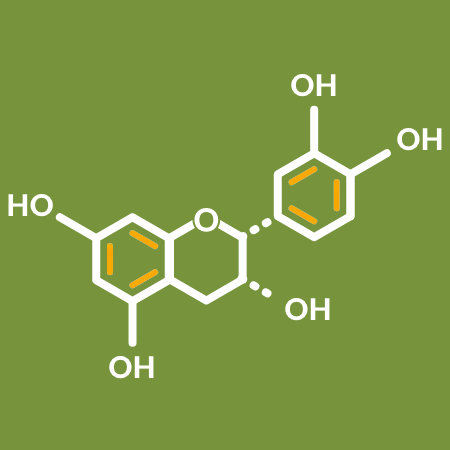
Participants who consumed cocoa flavanols daily for 1 month experienced several positive indications of heart health, including healthy blood vessel function and healthy blood pressure and cholesterol levels.
-

Daily consumption of cocoa flavanols can help promote optimal heart health and keep your entire cardiovascular system strong.
Shop CocoaVia™ Cardio Health, with 500mg of Cocoa Flavanols
-
CocoaVia™ Cardio Health Powder
Support heart health with every scoopRegular price From $49.99 $1.66 per dayRegular price Sale price From $49.99 $1.66 per dayUnit price / per -
CocoaVia™ Cardio Health Capsules
Support heart health with concentrated capsulesRegular price From $48.99 $1.63 per dayRegular price Sale price From $48.99 $1.63 per dayUnit price / per -
CocoaVia™ Cardio Health Cocoa Powder Stick Packs
On-the-go heart health supportRegular price $29.99Regular price Sale price $29.99Unit price / per
Study Abstract
Cocoa flavanol (CF) intake improves endothelial function in patients with cardiovascular risk factors and disease. We investigated the effects of CF on surrogate markers of cardiovascular health in low risk, healthy, middle-aged individuals without history, signs or symptoms of CVD. In a 1-month, open-label, one-armed pilot study, bi-daily ingestion of 450 mg of CF led to a time-dependent increase in endothelial function (measured as flow-mediated vasodilation (FMD)) that plateaued after 2 weeks. Subsequently, in a randomised, controlled, double-masked, parallel-group dietary intervention trial (Clinicaltrials.gov: NCT01799005), 100 healthy, middle-aged (35–60 years) men and women consumed either the CF-containing drink (450 mg) or a nutrient-matched CF-free control bi-daily for 1 month. The primary end point was FMD. Secondary end points included plasma lipids and blood pressure, thus enabling the calculation of Framingham Risk Scores and pulse wave velocity. At 1 month, CF increased FMD over control by 1·2 % (95 % CI 1·0, 1·4 %). CF decreased systolic and diastolic blood pressure by 4·4 mmHg (95 % CI 7·9, 0·9 mmHg) and 3·9 mmHg (95 % CI 6·7, 0·9 mmHg), pulse wave velocity by 0·4 m/s (95 % CI 0·8, 0·04 m/s), total cholesterol by 0·20 mmol/l (95 % CI 0·39, 0·01 mmol/l) and LDL-cholesterol by 0·17 mmol/l (95 % CI 0·32, 0·02 mmol/l), whereas HDL-cholesterol increased by 0·10 mmol/l (95 % CI 0·04, 0·17 mmol/l). By applying the Framingham Risk Score, CF predicted a significant lowering of 10-year risk for CHD, myocardial infarction, CVD, death from CHD and CVD. In healthy individuals, regular CF intake improved accredited cardiovascular surrogates of cardiovascular risk, demonstrating that dietary flavanols have the potential to maintain cardiovascular health even in low-risk subjects.
In August, 2020,AOAC international, a non-profit scientific organization that provides the platform, processes and scientific rigor that enable industry and regulators to keep our food and environment safe, accepted a new official method for measuring cocoa flavanol content to ensure consistency across the industry. As a result, the way cocoa flavanols were measured in scientific studies completed before 2020 is different than the way cocoa flavanols are measured in 2020 and beyond. Because CocoaVia™ products are all tested for cocoa flavanols, this shift in measurement will also impact our products. For your convenience, we have included a chart that converts these measurements, so you can compare our cocoa flavanol levels to those used in studies completed before 2020.
Learn more about this new standard of measurement:Lets discuss
